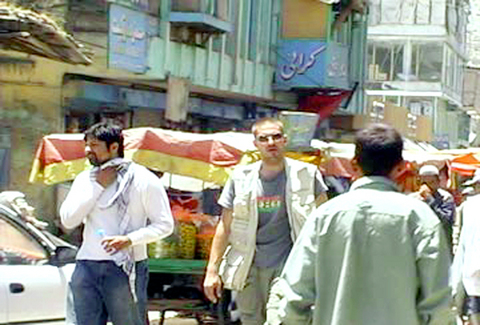I deliberately saw September Tapes without reading about it beforehand. When a note on screen announced that these tapes had been "obtained by soldiers at the Pakistani border" and that the film company had acquired the rights to them from Northern Alliance forces, I couldn't help thinking of The Blair Witch Project. The erratic camerawork was also a lot like Blair Witch, the 1999 horror movie playfully posing as a documentary. I reprimanded myself for the irreverence; this was a deadly serious film about the search for Osama bin Laden.
When Don Larson, the young American who has gone into Afghanistan less than a year after Sept. 11, walks out on a card game in Kabul after someone suggests Americans brought the terrorist attacks on themselves, I feared for his mental health. It's dangerous enough for any American to be in Afghanistan; for a hothead with bad judgment, it could be fatal.
Luckily, it soon becomes clear that Don is being played by an actor, George Calil, as is his translator, Wali Zarif (Wali Razaqi). They and Johnston have created a blend of fact and fiction, in which some Afghans (the Kabul police, for instance) know they are working with a script outline and others (people in the street) don't.

PHOTO COURTESY OF FOX MOVIES
The dead giveaway is that most characters speak like US reality-series contestants, improvising attempts at making certain points with believable verbal interaction. "Wali, if I get thrown in with the suspects they're arresting, I may actually learn something," Don says eagerly.
What September Tapes presents is actual film of the streets and countryside of Afghanistan; Afghans acting out arrests, threats and ambushes; a few people reacting genuinely; and no way to tell the difference. Maybe Johnston, who has directed television commercials and music videos, intended this to be a guessing game. But the method robs the real encounters of their power and, even more important, trivializes the subject.
Granted, Don and Wali's encounter with the gun dealers is unnerving. The producers said this was an authentic interaction, but the closing credits list actors' names as the dealers. The bullets and missiles whizzing by are also real, they say. On the other hand, while the harrowing post-curfew checkpoint incident did happen, what appears on screen is a re-creation. This succeeds only in being confusing, and even taken strictly as fiction, the film is unconvincing. At the end, Don's surprise revelation, meant to pack an emotional wallop, falls flat, as do some other revelations.
"Bin Laden and his men went right past the US military into the mountains," says a bounty-hunting commander (C.K. Smith), "right near the Pakistani border." They traveled on horseback, he says, at "nighttime under cloud cover."
Good to know.

In the March 9 edition of the Taipei Times a piece by Ninon Godefroy ran with the headine “The quiet, gentle rhythm of Taiwan.” It started with the line “Taiwan is a small, humble place. There is no Eiffel Tower, no pyramids — no singular attraction that draws the world’s attention.” I laughed out loud at that. This was out of no disrespect for the author or the piece, which made some interesting analogies and good points about how both Din Tai Fung’s and Taiwan Semiconductor Manufacturing Co’s (TSMC, 台積電) meticulous attention to detail and quality are not quite up to

April 28 to May 4 During the Japanese colonial era, a city’s “first” high school typically served Japanese students, while Taiwanese attended the “second” high school. Only in Taichung was this reversed. That’s because when Taichung First High School opened its doors on May 1, 1915 to serve Taiwanese students who were previously barred from secondary education, it was the only high school in town. Former principal Hideo Azukisawa threatened to quit when the government in 1922 attempted to transfer the “first” designation to a new local high school for Japanese students, leading to this unusual situation. Prior to the Taichung First

Chinese Nationalist Party (KMT) Chairman Eric Chu (朱立倫) hatched a bold plan to charge forward and seize the initiative when he held a protest in front of the Taipei City Prosecutors’ Office. Though risky, because illegal, its success would help tackle at least six problems facing both himself and the KMT. What he did not see coming was Taipei Mayor Chiang Wan-an (將萬安) tripping him up out of the gate. In spite of Chu being the most consequential and successful KMT chairman since the early 2010s — arguably saving the party from financial ruin and restoring its electoral viability —

The Ministry of Education last month proposed a nationwide ban on mobile devices in schools, aiming to curb concerns over student phone addiction. Under the revised regulation, which will take effect in August, teachers and schools will be required to collect mobile devices — including phones, laptops and wearables devices — for safekeeping during school hours, unless they are being used for educational purposes. For Chang Fong-ching (張鳳琴), the ban will have a positive impact. “It’s a good move,” says the professor in the department of